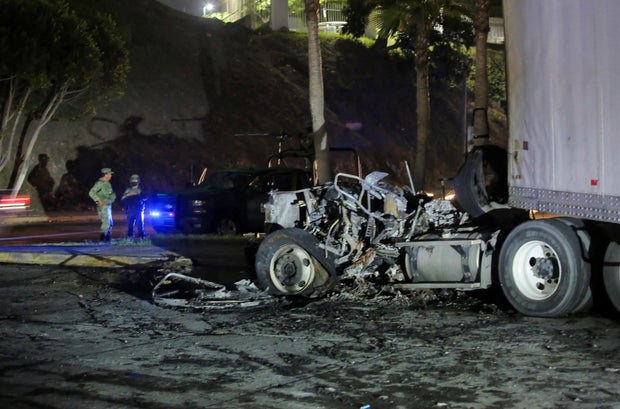UPDATED ON: AUGUST 14, 2022 / 7:35 PM / CBS/AP
Mexico’s president has begun exploring plans to sidestep congress to hand formal control of the National Guard to the army, a move that could extend the military’s control over policing in a country with high levels of violence.
That has raised concerns because President Andrés Manuel López Obrador won approval for creating the force in 2019 by pledging in the constitution that it would be under nominal civilian control, and that the army would be off the streets by 2024.
Neither the National Guard nor the military have been able to lower the insecurity in the country, however. This past week, drug cartels staged widespread arson and shooting attacks, terrifying civilians in three main northwest cities in a bold challenge to the state. On Saturday, authorities sent 300 army special forces and 50 National Guard members to the border city of Tijuana.
Still, López Obrador wants to keep soldiers involved in policing, and remove civilian control over the National Guard, whose officers and commanders are mostly soldiers, with military training and pay grades.

Tijuana Mayor Montserrat Caballero issued a public appeal to “organized crime,” the term used in Mexico for drug cartels, to stop the growing trend of targeting innocent civilians.
“Today we are saying to the organized crime groups that are committing these crimes, that Tijuana is going to remain open and take care of its citizens,” Caballero said in a video. “And we also ask them to settle their debts with those who didn’t pay what they owe, not with families and hard-working citizens.”
The extent of the violence was still unclear Saturday. Late Friday, the U.S. Consulate General in Tijuana said in a statement that it “is aware of reports of multiple vehicle fires, roadblocks and heavy police activity in Tijuana, Mexicali, Rosarito, Ensenada, and Tecate.”
Karina Bazarte, a reporter from CBS San Diego affiliate KFMB-TV, has family in Tijuana, and travels there on a weekly basis, but she said “we couldn’t go back home” amid the violence.
“Literally, people were on the border-line to go back home to the United States, and their cars were getting lit up,” Bazarte said.
On Saturday, few people ventured out on the streets in Tijuana and many of the bus and passenger van services stopped running, leaving some residents unable to get where they were going.
“Let them fight it out among themselves, but leave us alone,” said Tijuana resident Blanca Estela Fuentes, as she looked for some means of public transport. “So they kill each other, they can do whatever they want, but the public, why are we to blame?”
Later Saturday, Caballero said some bus and van routes had resumed service.
The federal public safety department said one person was wounded in the violence and that federal, state and local forces had detained 17 suspects, including seven in Tijuana, and four each in Rosarito and Mexicali.
It said some of the suspects had been identified as members of the Jalisco cartel, the group blamed for burning stores and shooting people earlier this week in the states of Jalisco and Guanajuato.
The area around Tijuana, which borders Southern California, is a lucrative drug-trafficking corridor long dominated by the Arellano Felix cartel, but which has since become a battle ground between various gangs, including the Jalisco and Sinaloa cartels.
The mayor’s comment about Tijuana remaining open was an apparent reference to the border city of Ciudad Juarez, across from El Paso, Texas, where some classes and public events were cancelled after similar violence on Thursday.
Alleged gang members killed nine people, including four employees of a radio station, in Ciudad Juarez after a fight between rival gangs at a local prison left two inmates dead.
On Tuesday, drug cartel gunmen burned vehicles and businesses in the western states of Jalisco and Guanajuato in response to an attempt to arrest a high-ranking cartel leader of the Jalisco cartel.
Oxxo, a national chain of convenience stores owned by Femsa, the country’s largest bottling company, said 25 of its stores in Guanajuato – which borders Jalisco, home to the cartel of the same name – were either totally or partially burned Tuesday.
Speaking about the Ciudad Juarez violence Thursday, President Andrés Manuel López Obrador said: “They attacked the civilian, innocent population like a sort of revenge. It wasn’t just a clash between two groups, but it got to the point where they began to shoot civilians, innocent people. That is the most unfortunate thing in this affair.”
Four employees of the MegaRadio station who were broadcasting a live promotional event outside a pizza store in Ciudad Juarez were killed in the shootings.
Such random violence is not without precedent in Mexico.
In June of last year, a rival faction of the Gulf cartel entered the border city of Reynosa and killed 14 people the governor identified as “innocent citizens.” The military responded and killed four suspected gunmen.
